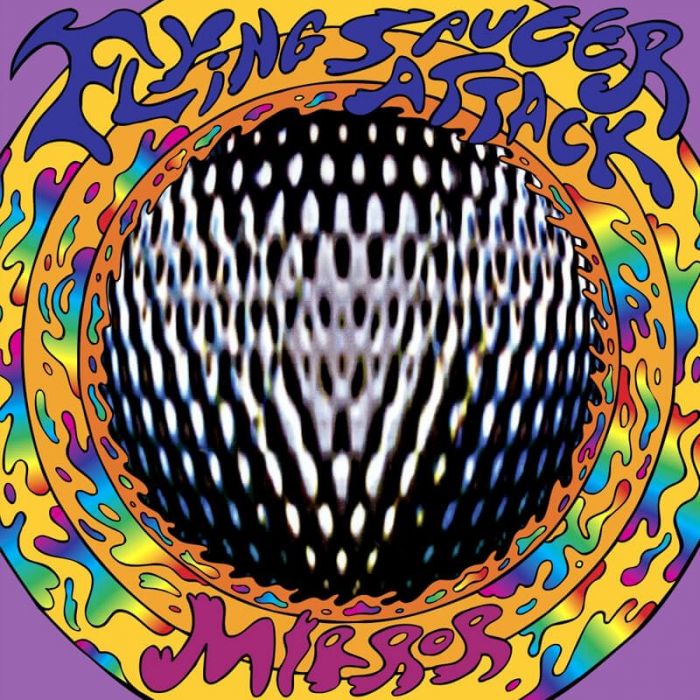Mirror by Flying Saucer Attack (Review)

In the world of droning, fuzzy space rock, the name David Pearce (the main man behind Flying Saucer Attack) is probably as revered as Kevin Shields (My Bloody Valentine). Both have a knack for coaxing huge volumes of noise from their guitars that are as beautiful as they are overwhelming. In all honesty, though, I’m less familiar with the Pearce’s works. The only other Flying Saucer Attack release I own is Distance, a collection of b-sides and rarities. As one of my first forays into this strange new musical world, Distance was eye-opening, but certainly not anything that I listened to on a regular basis. It was just too, well, noisy to be really enjoyable.
Mirror is certainly noisy, fuzzy, and psychedelic as all get out. However, it’s also incredibly listenable. Unlike so many artists that like to experiment with tortured guitars and white-noise freakouts, Pearce never forgets that there needs to be something tangible, something listenable working at the heart of it all. “Space (1999)” doesn’t start off with all that much promise, but after the initial static-filled seconds, a lovely guitar-filled haze begins to emanate from the speakers. Thick walls of noise give way to soft, metallic drones, like rays of moonlight punching through a cloudy night.
Somewhere in the midst of it all wander’s Pearce’s hazy, amorphous vocals. For most of the album, Pearce is content to let his voice meander somewhere in the distance, adding a touch of humanity to the fuzzed-out surroundings, but not so much as to spoil the songs. On the songs where Pearce decides to take a more active vocal stance, two things are revealed; his voice is not that great, nor are his lyrics.
But the album’s real Achilles’ Heel lies in Pearce’s use of jungle beats. When I first read the description of Mirror, which mentioned Pearce’s electronic leanings, it sounded just like a rehashing of Amp’s Stenorette. (In other words, drone-out wunderkids discover jungle rhythms and attempt to merge the two, with mixed results.) Of all of the Flying Saucer Attack camp, the only one I’ve heard get it right is Matt Elliot (aka The Third Eye Foundation). But Pearce is not a programmer; he’s a guitar abuser, one who is adept at running his guitar through so many effects that the beauty gets wrangled from each fuzz-ridden strum.
“Wintersong” takes the sound that Pearce has used throughout the album and tries to inject a little dose of jungle, but the result sounds contrived. The frantic beats seem out of place with the formless noise stuff that surrounds them. Each beat just stirs up the swirling clouds of guitars, but never gets anything meaningful out of them. The only song that successfully melds Pearce’s electronic forays and psychedelic meanderings is “Dust,” where the jungle-lite beats underscore Pearce’s acoustic guitar. “Rise” takes a more Third Eye Foundation-esque approach, with howling guitars wailing somewhere off behind a veil of sharp beats.
Mirror is at its best when Pearce is content to let the guitars chime, to ring out endlessly down a hazy maze of spiraling distortion and fuzz-drenched beauty, where strands of folk-influenced melodies point to some lightheaded place. Songs like “Space (1999)” and “Islands” work because the sounds are so bizarre and unfamiliar, yet still beautiful and pleasing to the ear. There’s an eerie, dreamlike quality that pervades much of the album, like some moonlit mist. But when Pearce begins to try and throw in little bits of jungle and electronica, or to ramp up to album’s noise freak-out quotient, the album feels awkward and schizophrenic.